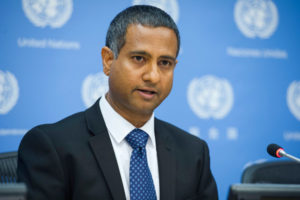Dr Layla Aitlhadj, the Director of Prevent Watch, argues that attempts to repackage or reform the Prevent counter-extremism strategy are doomed to failure.
Earlier this month, in a report to the UN Human Rights Council, the UN Special Rapporteur on freedom of religion or belief, Ahmed Shaheed, proffered a damning indictment of counterterrorism and security policies implemented by numerous states.
He stated that such policies had “served to perpetuate, validate and normalise discrimination, hostility and violence towards Muslim individuals and communities,” who had been framed as “both high-risk and at risk of radicalisation.”
As a Muslim involved in advocacy, highlighting the impact of such policies in the context of the UK for several years, I have heard the stories of many of the individuals directly and indirectly impacted by the UK’s counter terrorism policy.
For over a year I have been the Director at Prevent Watch, an organisation that supports those impacted by Prevent – described as one of the “softer” counter terrorism tools. Prevent Watch has, to date, provided free information and support to over 500 individuals, most of whom are Muslim. These cases attest to the Special Rapporteur’s statement that such discriminatory policies “make it difficult for a Muslim to be a Muslim.”
The criticisms against the pre-crime policy that is Prevent are very well documented. The case-based evidence, Freedom of Information responses and leaked government documents all show that Prevent is an inherently Islamophobic policy.
Despite such evidence being cited by activists, NGOs and prominent individuals who are familiar with the counter-extremism terrain and close to those impacted by Prevent – and despite these concerns being echoed by UN rapporteurs, MPs, and other professional bodies such as the NUT and Royal College of Psychiatry – the UK Government has constantly side-stepped the elephant in the room: that Prevent was designed to target Muslims, and this, combined with its pre-crime basis, means that it has been, and will always remain, inherently Islamophobic.
Subscribe to our newsletter and stay updated on the latest news and updates from around the Muslim world!
This remains the case irrespective of how many other communities are pulled into Prevent’s dragnet to dilute the Prevent referral figures.
Scathing criticism
It is unfortunate that, despite the latest UN Special Rapporteur’s report and its findings, we know that the UK will likely neither accept nor acknowledge the findings. After all, this is not the first time that a UN Special Rapporteur has delivered scathing criticism about the Prevent strategy:
2017 – Ben Emmerson, the Special Rapporteur on the promotion and protection of human rights and fundamental freedoms while countering terrorism, said that teachers “should not be required to act as watchdogs or intelligence officers.”
2017 – Maina Kiai, Special Rapporteur on the rights to freedom of peaceful assembly and of association, said that “dividing, stigmatising and alienating segments of the population, Prevent could end up promoting extremism, rather than countering it.”

2018 – Professor E. Tendayi Achiume, UN Special Rapporteur on contemporary forms of racism, racial discrimination, xenophobia and related intolerance, said that “there has been no evidence that Prevent actually prevents extremism, or that the causal link between extremism and terrorism is empirically sound.”
2018 – Professor Joseph Cannataci, Special Rapporteur on the right to privacy, stated that representatives of British Muslims reported that Prevent is “dividing, stigmatising and alienating communities.”
2020 – Fionnuala Ní Aoláin, UN Special Rapporteur on the promotion and protection of human rights and fundamental freedoms while countering terrorism said that Prevent “lacks a consistent rule of law or human rights grounding.”
There is clearly a pattern to the UK’s stubborn blindsiding of these criticisms.
It is particularly concerning that the UK, which was elected in October 2020 for its sixth term to the UN Human rights council, is reluctant to show the same leadership for human rights at home as it preaches abroad. This policy dissonance is further accentuated upon the realisation that the UK has been marketing the Prevent strategy around the world as a “successful” model which is being adopted as CVE (Countering Violent Extremism).
Moving forward
But instead of removing the basis for these injustices, there are trends by the UK government to prune and redecorate Prevent. This can be seen in the historic reviews of Prevent, which have only served to entrench and broaden the policy, and the latest farcical attempt, or two, at an “independent” review.
Some may believe these concerns may be addressed as part of the Independent review but it is hard to give any credibility to a process which decides that the first choice to lead the Prevent review should be Lord Carlisle, and the second choice, William Shawcross.
Carlisle was removed from the post in 2019 due to his historic support and defence of Prevent. His successor continues to be met with equal controversy. He has a track record of bias against Islam, expressing concern over the future of Europe and the faith, and Muslim civic society, during his stint as the head of the Charity Commission.

Consequently, numerous organisations have rightfully boycotted this review process, including Prevent Watch.
When it comes to redecorating Prevent, the Commission for Countering Extremism’s report on “hateful extremism” is worthy of note. Under the promotion of its head, Prevent champion Sara Khan, the proposals in the report effectively shift the pre-crime logic of Prevent into the legislative space.
Thus, even if Prevent as an extra-legal policy were to be scrapped in its entirety, we are left with vague legislation in its wake, injected with imagination and uncertainty to regulate thought. It will increase the perpetuation of what UN Special Rapporteur, Ahmed Shaheed has rightly called an “epidemic”: the “institutional suspicion of Muslims.”
There is an urgent need to take criticisms like those made by UN Special Rapporteurs seriously. Here at Prevent Watch, we have published the experiences of clients interacting with Prevent. Tellingly, none of some 500 clients view Prevent as “safeguarding” or as a tool for “support.”
The situation for the government is becoming increasingly untenable. Prevent is harming society and no number of haircuts and lipstick will be able to change this fact.
The “epidemic” that is Prevent must be abolished.






















